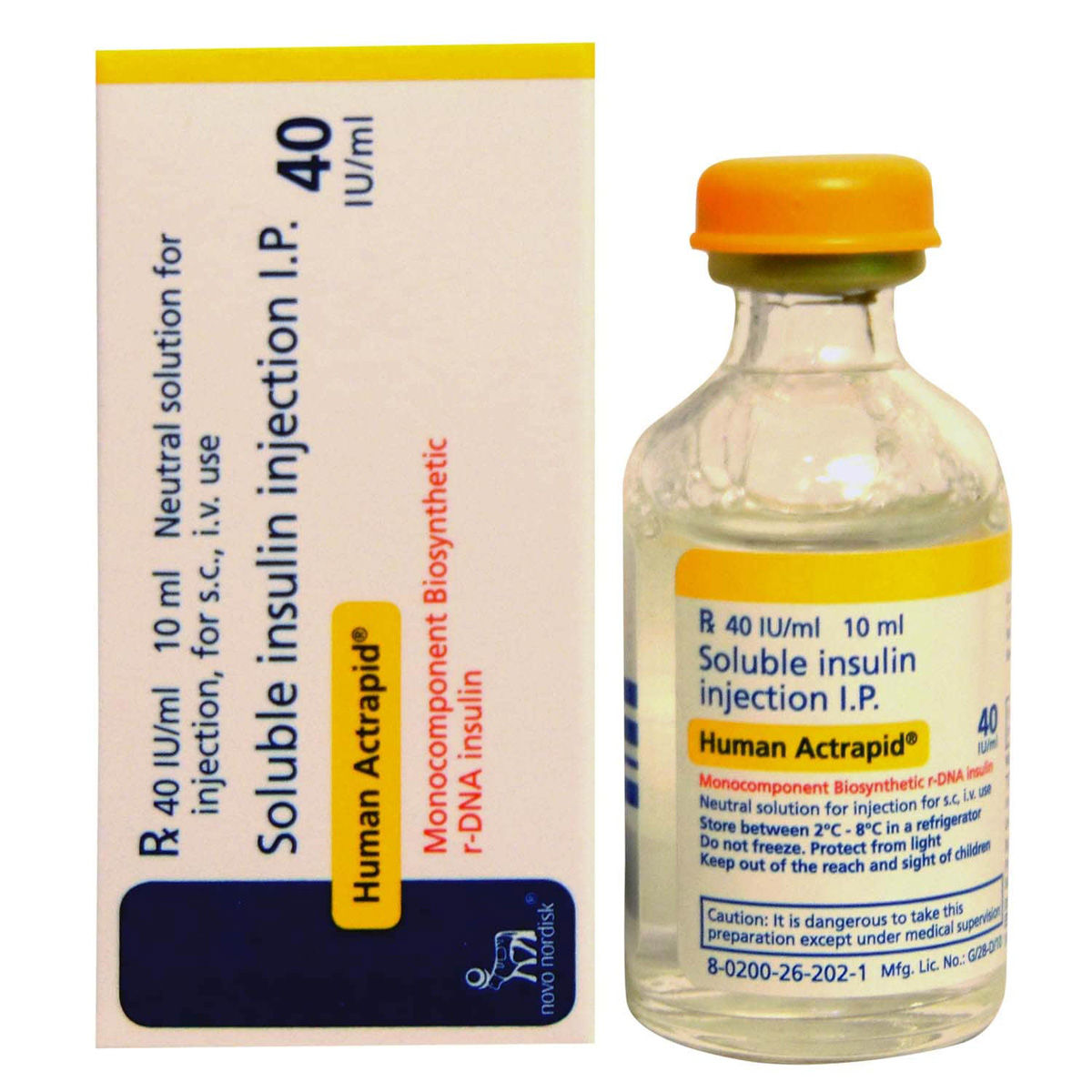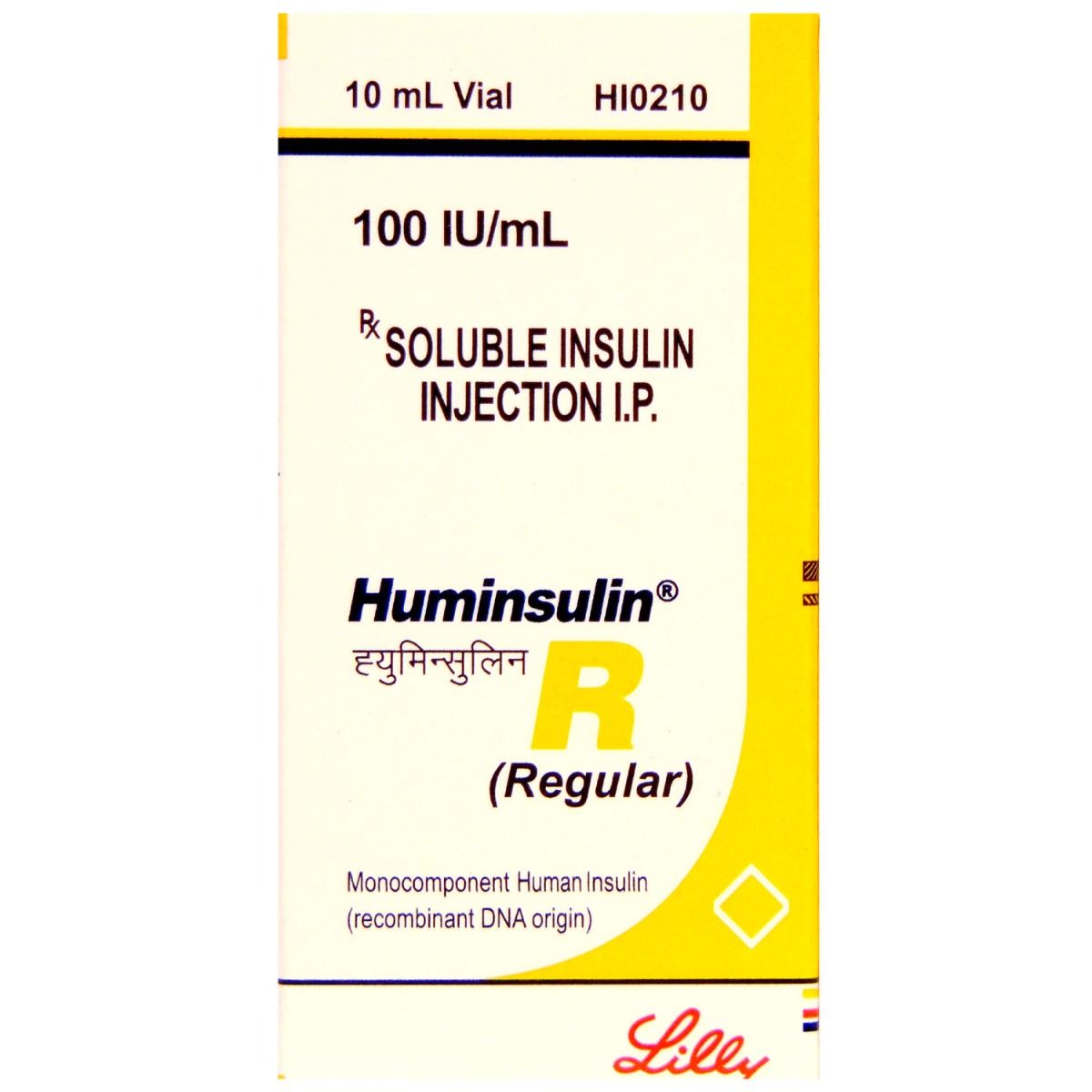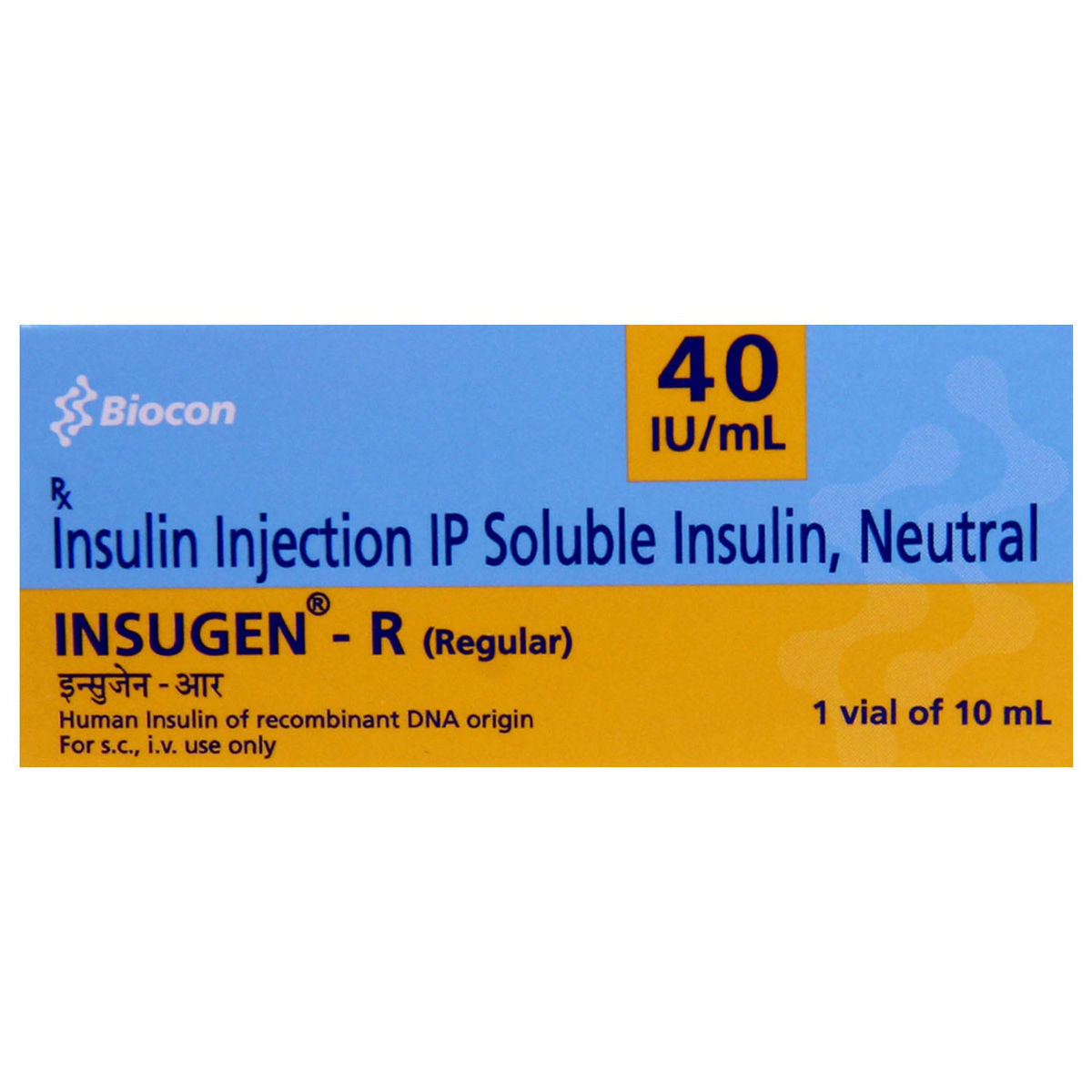Human Insulin
About Human Insulin
Human Insulin is used to treat type 1 and type 2 diabetes mellitus. Diabetes mellitus is a condition in which glucose levels are elevated in the body. In type 1 diabetes, the body does not make enough insulin (a hormone essential for glucose metabolism). In type 2 diabetes, either the body stops producing enough insulin, or there is resistance to the action of insulin.
Human Insulin contains 'Human Insulin'. It replaces the deficient hormone 'insulin' in patients with diabetes. Human Insulin suppresses the production of sugar in the liver and facilitates the reuptake of sugar in the fat and muscle cells; thereby, Human Insulin ensures rapid and consistent sugar control. It starts to work within 30 min after injection, and its action lasts up to 8 hours.
Take Human Insulin as prescribed by your doctor. A healthcare professional will teach you how to take the injection. It can cause some side effects, such as low blood sugar, swelling in your hands or feet, weight gain, or thickening of the skin at the injection site. Consult your doctor if any of these side effects persist or get worse.
Do not take Human Insulin if you are allergic to insulin or have an episode of hypoglycemia (low blood sugar). Talk to your doctor if you have a history of liver or kidney diseases and if you are pregnant or breastfeeding. Also, inform your doctor if you are taking any other anti-diabetic medications. If you experience an episode of hypoglycemia, seek medical attention immediately.
Uses of Human Insulin
Medicinal Benefits
Human Insulin contains Human Insulin, which is a short-acting form of insulin. It helps lower blood sugar levels in both adults and children. It stimulates the recovery of sugar in muscle and fat cells and thus suppresses the production of sugar in the liver. Human Insulin helps in improving glycemic control, which in turn decreases the risk of progression of complications of diabetes like damage to the retina (retinopathy), damage of kidney (nephropathy), damage of nerve cells (neuropathy), delayed wound healing, diabetic foot ulcer, and others.
Directions for Use
Storage
Side Effects of Human Insulin
- Low blood sugar
- Swelling in your hands or feet
- Weight gain
- Thickening of the skin at the injection
Drug Warnings
Do not take Human Insulin if you are allergic to any of the contents. Inform your doctor if you have hypoglycemia (low blood glucose levels), hypokalemia (low levels of potassium in the blood), heart, kidney or liver problems. Consult a doctor before taking Human Insulin if you are pregnant or breastfeeding. Human Insulin may cause dizziness, so drive only if you are alert. You are recommended not to consume alcohol as it may cause unpleasant side effects. Care should be taken when you are travelling across more than 2 time zones; your doctor may adjust your insulin schedule.
Drug Interactions
Drug-Drug Interactions: Human Insulin may interact with antidiabetic medications such as thiazolidinediones (rosiglitazone and pioglitazone) and increase the risk of heart failure. It may also interact with antibiotics (levofloxacin, norfloxacin, and ofloxacin, etc), antidepressants, medications to treat high blood pressure (enalapril, lisinopril, captopril, losartan, valsartan, propranolol, and metoprolol), diuretics, medications used to treat heart diseases and cause hypoglycemia (low blood sugar).
Drug-Food Interactions: Try to avoid alcoholic beverages with Human Insulin as it may alter your blood glucose levels.
Drug-Disease Interactions: Inform your doctor if you have kidney disease, liver disease, low blood sugar level (hypoglycemia), and low potassium level (hypokalaemia).
Drug-Drug Interactions Checker List:
Safety Advice

Alcohol
unsafeIt is advised to avoid alcohol intake since it may worsen the side effects and increase the risk of developing low blood sugar levels.

Pregnancy
cautionIt is advised to use Human Insulin in pregnancy only if the benefit outweighs the risk. Please consult your doctor before starting Human Insulin if you are pregnant or planning to conceive.

Breast Feeding
cautionHuman Insulin should be used in breastfeeding mothers only if clinically needed.

Driving
cautionYour driving may be affected if your blood sugar levels are too high or too low. Do not drive or operate machinery if you also experience blurred vision, dizziness or drowsiness due to extremely low or high blood sugar.

Liver
cautionHuman Insulin should be used with caution in patients with liver diseases. Your doctor may adjust the dose of this medicine before prescribing it.

Kidney
cautionHuman Insulin should be used with caution in patients with kidney diseases. Your doctor may adjust the dose of this medicine before prescribing it.

Children
cautionHuman Insulin is not recommended for use in children below 2 years of age.
Habit Forming
Diet & Lifestyle Advise
- Include foods rich in healthy carbohydrates, fibre, fruits, whole grains, and vegetables in your diet.
- Try eating food at regular intervals. Do not skip meals. Also, try not to overeat.
- Follow a healthy diet and walk for at least a few minutes to complement treatment with Human Insulin.
- Maintain a healthy weight by exercising regularly.
- Rest properly, avoid stress by doing meditation or yoga.
Special Advise
If you feel any symptoms of hypoglycemia (fatigue, dizziness, confusion, heart palpitations, shakiness and anxiety), consult your doctor immediately.
Patients Concern
Disease/Condition Glossary
Diabetes mellitus: It is a metabolic disease that causes high blood sugar levels. Type 1 diabetes (juvenile diabetes) is an autoimmune disease in which the immune system attacks and destroys its own cells in the pancreas, thereby producing no insulin. It often occurs in childhood. Type 2 diabetes (adult-onset diabetes) occurs when the insulin (a hormone produced by the beta cells of the pancreas) is resistant in breaking the glucose to produce energy (insulin resistance) or the pancreas produces little or no insulin at all. Symptoms include frequent urination, increased thirst, hunger, and blurred vision. The treatment includes oral glucose-lowering medicines and insulin shots.
FAQs
Human Insulin is used to treat type 1 and type 2 diabetes mellitus.
Human Insulin works by increasing the glucose uptake by fats and muscles, suppresses the production of glucose in the liver, and also the formation of glycogen from glucose. Thereby, Human Insulin helps in reducing the glucose levels in the blood.
In hypoglycemia, blood sugar levels decrease significantly. It causes symptoms such as dizziness, headache, sweating, hunger, loss of consciousness, rapid breathing, or seizure (fits). In such cases, seek medical attention immediately.
If you experience low blood sugar, eat glucose tablets, chocolate, or another high-sugar snack, such as a sweet or biscuit. Use a blood glucose monitor to test your blood sugar levels after 15 minutes if possible.
Do not stop taking Human Insulin without consulting your doctor on your own as it may cause an increase in blood glucose levels. Continue taking Human Insulin for as long as your doctor has prescribed it to you. Do not be reluctant to speak with your doctor if you experience any difficulty while taking Human Insulin.
You are recommended to avoid white bread, maida, poori, naan, noodles, biryani, fried rice, corn flakes, cheese, ice creams, milkshakes, beef, pork, sugarcane juice, soft drinks, sweetened health drinks and beverages. Also, avoid mango, seetaphal, jack fruit, fruit salads with ice cream, and fruit-based desserts.
No, do not stop taking Human Insulin without consulting your doctor as it may lead to high blood sugar levels and may worsen your condition resulting in complications. If you experience any side effects or discomfort, contact your doctor. You may need dose adjustment.
Taking injection at the same site may cause local irritation, itching and lump formation. Therefore, it is best to avoid taking injections at the same site or maintain a gap of at least one day.
Maintain a diet that includes chapatis, puffed rice with vegetables, multigrain bread, plain cooked dal, roasted grams soups, sprouts, cooked vegetables with less oil, steamed vegetables, orange, jamun, guava, watermelon, apple, papaya, curd, cow’s milk, thin buttermilk, fish (baked, grilled, or steamed), cashew nuts, peanuts, and walnuts (handful). Avoid alcohol consumption and quit smoking. Exercise regularly and brisk walk daily for 30 minutes. Also, limit intake of sugar.
The risk factors for developing low blood sugar levels include not taking adequate meals or skipping meals, excessive insulin use, too much alcohol intake, fever and too much exercise. Some medications, like other diabetes medicine glimepiride, medicines used for fever and pain (salicylates), ramipril, etc., can result in such episodes when used with insulin. Inform your doctor about these episodes as you may need dose adjustment.
It depends on whether you have type 1 diabetes mellitus or type 2. If you have type 1 diabetes, Human Insulin should be used for the rest of your life as your body does not produce adequate insulin and the only treatment available is external source of insulin which cannot be stopped. However, if you have type 2 diabetes mellitus, the doctor may stop Human Insulin if your blood sugar levels are well controlled with healthy diet, exercise and other diabetic medications. However, do not stop taking it on your own without consulting your doctor as it may worsen your condition.
Human Insulin can be used with other diabetes medicine only if prescribed by a doctor. Thus, please consult a doctor before using Human Insulin with other medicines.
Human Insulin is injected under the skin in the areas such as thighs, buttocks, abdomen or upper arms. Never inject Human Insulin into a muscle or vein. However, it is recommended to rotate your injection sites with each dose to reduce the risk of developing pitted or thick skin and lumps at the injection site. Inject Human Insulin as shown by the doctor.
It is advised to take doctor’s advice before using Human Insulin if you are pregnant or planning pregnancy. Your doctor will prescribe Human Insulin if benefits are greater than the risks.
Yes, Human Insulin is safe to use in type 2 diabetes if used as advised by the doctor. Monitor your blood sugar levels regularly. Your dosage may need to be changed as per your needs. Follow the lifestyle changes as advised by your doctor. Discuss with your doctor about the managing and preventing side effects.
The side effects of Human Insulin include injection site reactions such as swelling, itching or redness, weight gain, and swelling due to fluid retention. Also, it may cause lipodystrophy (skin thickening or pits at the injection site). To avoid this side effect, rotate injection site for each dose.
Yes, Human Insulin cause hypoglycaemia (low blood sugar) as the most common side effect. It occurs more frequently if you skip meals or delay food, drink alcohol, over-excessive or use other antidiabetic medications along with Human Insulin. So, do not skip meals and be consistent in amount and timing of your meals. If you over exercise, take some snacks as per your requirement. It is important to monitor your blood sugar levels regularly. Always carry some fruit juice, sugary candies, glucose, or glucon-D with you. If you notice any fluctuations in your blood sugar levels, consult your doctor.
If you experience weight loss or gain, increased stress, illness, dietary changes such as missed meals or alcohol consumption, then you should consult your doctor for dose adjustment. If you have recently changed your workout routine or are taking any medicines, your dose may need to be changed. Also, lookout for certain side effects caused by Human Insulin. Your doctor will advise you on how to prevent them. These side effects are usually temporary but if they are very severe, you may need dose adjustments.
Human Insulin needs to be refrigerated before its first use. Unopened vials, disposable dosing devices and human insulin pens must be stored in a refrigerator where the temperature is between 2°C to 8°C. Do not freeze and do not use Human Insulin that has been frozen. When the cartridge has been inserted into the injection pen, it should not be refrigerated and should be kept at room temperature, (below 30°C) and must be used within 28 days or be discarded, even if they still contain Human Insulin.
Human Insulin is a man-made version of human insulin, produced by a biotechnology method called recombinant DNA technology.








